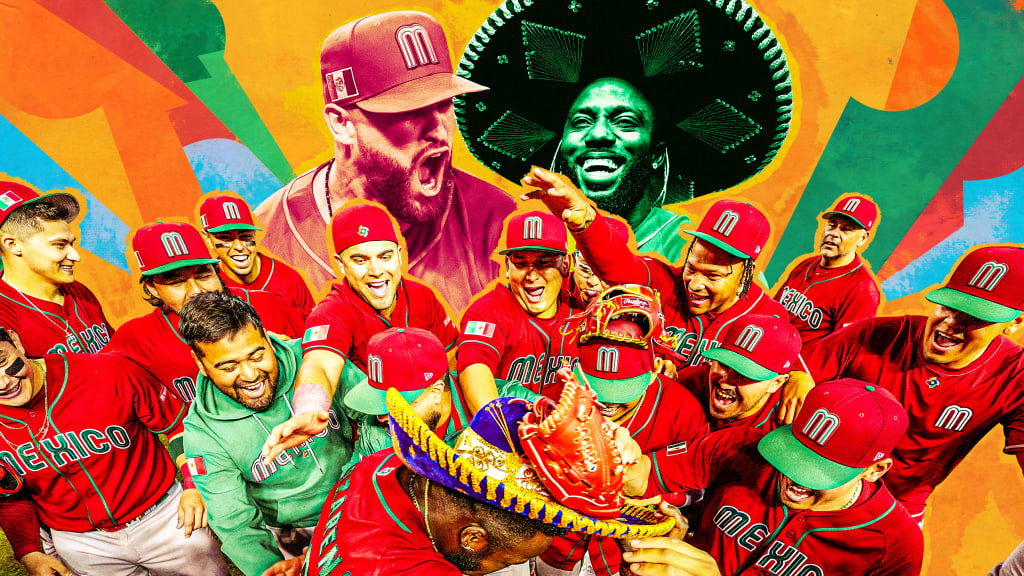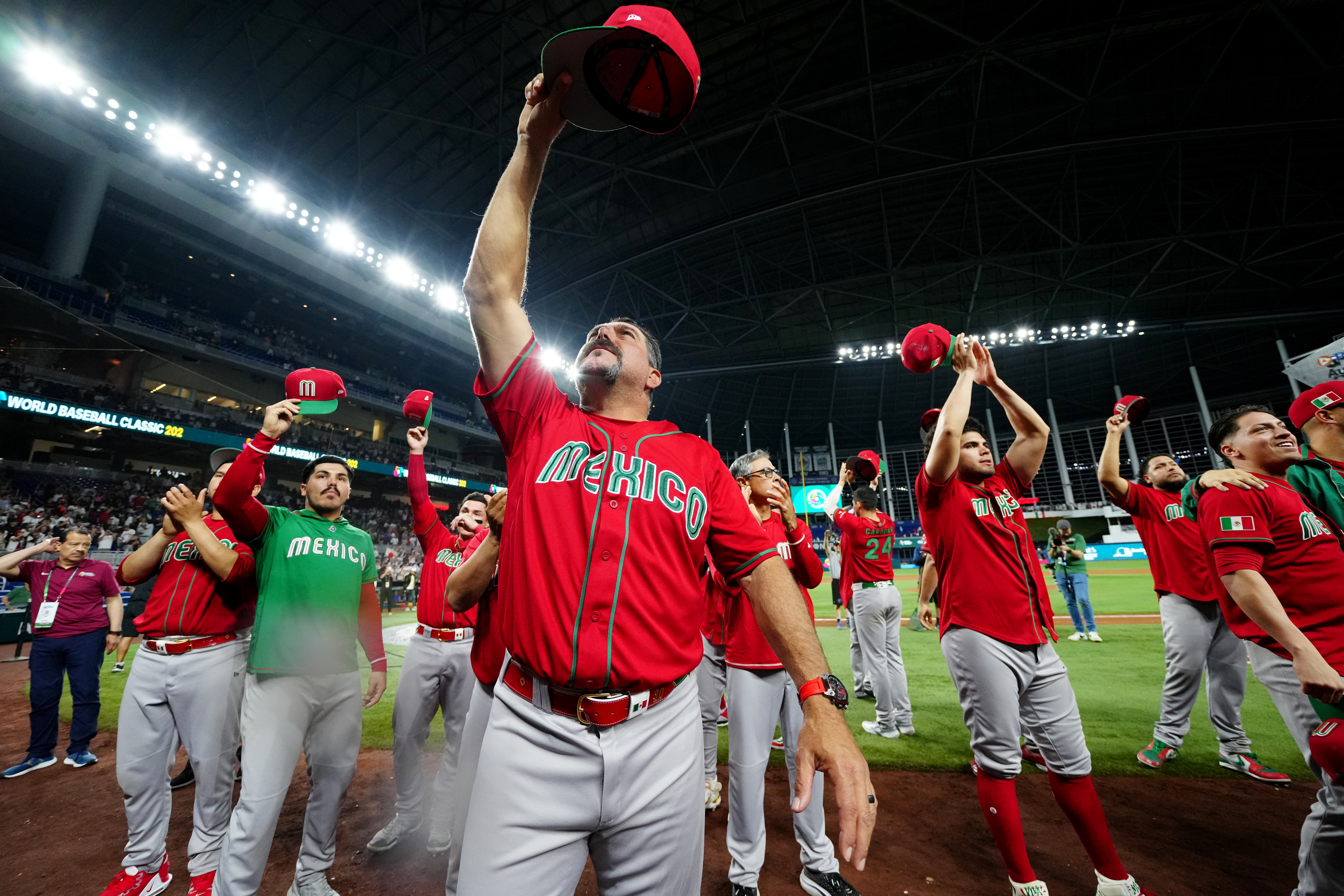
Just three outs are all that separated Team Mexico and its first trip to the World Baseball Classic championship game. Leading the soon-to-be-champion Samurai Japan team, 5-4, it all unraveled as Japan's superstar hitters woke up: A Shohei Ohtani double, Masataka Yoshida walk, and a game-winning double from Munetaka Murakami -- who hit 56 home runs in Japan last season -- ended the Cinderella run.
"We were one pitch away," manager Benji Gil said after the game. "The home run they connected on, it was a good pitch. But we were very close to the victory. ... I'm very proud of my players, of the staff, the management that put together the team. And also, I'm proud of the fans for the support they provided to the team and the good vibes of the Mexican fans around the world."
Though there may not be moral victories in baseball, there was still plenty to be excited about for El Tri. After losing its first game to Colombia -- threatening the country's chances of escaping pool play -- Mexico blew out the heavily favored defending champion, Team USA, 11-5. They came back from a four-run deficit to defeat back-to-back runners-up Puerto Rico. After failing to advance beyond the first round in each of the last two tournaments, Mexico made a major statement on the international stage about the state of the game in the country.
"I feel very happy about how things turned out for for the team, of course, and for Mexican baseball," GM and former Team Mexico pitcher Rodrigo López told MLB.com. "I'm pretty proud of the guys -- not just the players, but all the staff that were involved."
López pitched for Team Mexico at three separate Classics from 2006 to '13, but this tournament was a new experience for him.
"We created such a good bond that was like a family and there were tears at the end. There was some emotional things that I never experienced before as a player," López said.
"Those players, this family that we have in the clubhouse now, they gave everything on the field," Gil said back in March, following the loss to Japan. "They played with heart, with soul. They were fighting. They were doing all their best to put the name of Mexico at the highest level. We didn't get the win today, but Mexico is at the highest level today in this sport."
With this weekend's Mexico Series between the Giants and Padres at Alfredo Harp Helú Stadium in Mexico City putting the baseball spotlight back on the country, it's reasonable to wonder what impact this team has had on the baseball program, both at home and abroad. Certainly, the work that López and assistant GM Mariana Patraca did in constructing the roster deserves credit. Just like the tournament itself, Team Mexico's roots were global.
There were MLB stars who were born in Mexico, like Giovanny Gallegos and Luis Urías, along with players who have called the Liga Mexicana de Béisbol (LMB) their home for at least parts of their career, like current Nationals first baseman Joey Meneses or catcher Alexis Wilson who currently plays for Tigres de Quintana Roo in Cancun. López estimates that about 60 percent of the roster had played or been developed by teams in the Mexican League.
Though they didn't receive the attention that Lars Nootbaar and Tommy Edman received for being the first U.S.-born players to suit up for Japan and Korea, respectively, starter Patrick Sandoval, catcher Austin Barnes, and outfielder Alex Verdugo were just some of the players from America who joined the team and reconnected with their roots.
"I didn't really know what to expect walking into it," Sandoval said, "But they accepted us right away and really helped me dive into my Mexican culture and heritage."
The breakout star of the tournament -- Randy Arozarena -- was even born in Cuba. But he wanted to represent the country that he feels is his true home so badly that he made sure he had his citizenship documents done in time so he could join the team.
"I think the most important thing was that all the guys who were part of the team -- from our superstars to the bullpen catcher, every one of them -- they were really proud and really excited to be part of the team," Patraca said. "Even the staff we selected, like the strength and conditioning coach or the trainers, we made sure that everyone who was part of the team was as excited as us in the office. I think that was the special ingredient for the success of the team."

While the players got a chance to connect with their roots, it was the team's performance on the field that has laid out a bright future for both the national team and the sport in Mexico.
"[The WBC] was very significant for the country," Joey Meneses told MLB.com's Jess Camerato. "I think nobody expected what we did at the World Baseball Classic because we didn’t have so many stars on the team. … For us, it’s very important baseball grows more because I think we have a lot of kids in Mexico, a lot of talent from Mexico.”
While Gil was focused on winning the tournament, with every big home run or clutch play, he couldn't help but reflect on the impact it was making in the country.
"In Mexico, there will be a radical, extreme change," Gil said after the loss to Japan in the semifinals. "I don't know whether tomorrow, in one week, in one month, or in one year, but baseball will start growing. It will be the most important game again. These two weeks are going to attract so many young players in Mexico and also Mexicans that live abroad. For that reason, I believe that this was a victory, even when we didn't win today."
It didn't even necessarily have to be about baseball for it to resonate.
"For young kids in Mexico that are inspired by this family -- this group of Aztec warriors that are playing their butts off and doing everything they can to make all the Mexicans all over the world proud -- [the lesson] is follow your dreams," Gil said. "Because if your dream is not to be a baseball player, if your dream is to be a great doctor or be a great lawyer or an engineer, these kids [can find inspiration.]"
While Mexico looks ahead to next year's Premier12 tournament -- a competition featuring the top 12 nations as ranked by the World Baseball Softball Confederation (WBSC) -- before planning for the 2026 World Baseball Classic and 2028 Olympic games, they are already seeing an impact at home. The hunger for baseball is high, with even preseason exhibition games before the start of this year's LMB season selling out.
"While the tournament was on, you didn't realize how big it was," López said. "Mexico has always said summer leagues. It's the only country that has professional baseball year round -- winter ball and summer league. To see those crowds during the exhibition game for Liga Mexicana de Beisbol, I started to realise how big the impact was."
"I have a friend who said when Mexico was playing Japan, she saw people stop and stand by the minimarket just because they had the game on TV," Patraca said. "It became viral on social media and came to a point that people started making memes or comparing the soccer national team with the baseball team."
The next steps are capitalizing on that excitement. López wants to see more of the Mexican games available for fans to watch on TV, phones or tablets. He hopes for more coaches to reach young children who are interested in learning the game, while also improving things like "physical preparation, game preparation, all the things that MLB teams have right now. Things like strength and conditioning, nutrition, all of those things."
With three years to go before the next World Baseball Classic, there's time to look ahead for the future. But when looking back at what Team Mexico already accomplished, there's already so much to be proud of.
"We already proved that there's talent in Mexico," Patraca said. "When you do things right, when you plan, when you have heart and when you make decisions for the best of the team, you can go far."
